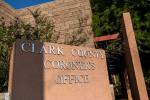Smith Center pays off for Las Vegas with election-season lecture
Frank Rich and Fran Lebowitz are intelligent, engaging and witty writers, longtime friends who have carried on conversations about the state of the union for three decades. Oh, to be a fly on that wall.
Well, now we can. And we have The Smith Center for the Performing Arts to thank for it.
Rich, an essayist and editor-at-large for New York magazine, and Lebowitz, the author of books including "Metropolitan Life" and "Social Studies," are touring the country, bringing their unique brand of conversation to places such as Harvard University, the University of Southern California, Washington, D.C., and, of course, their hometown of New York City.
But Las Vegas got on their list, too, because of The Smith Center, where he and Lebowitz will speak at 7:30 p.m. Wednesday. (Tickets are still available via The Smith Center's website, www.thesmithcenter.com. Full disclosure: My wife works for a public relations company that promotes downtown, including The Smith Center.)
Rich said in an interview that the brand-new performing arts center in the desert has received a lot of attention back East, and thus it landed on the schedule when the lecture agent put the tour together.
"The Smith Center as a venue put Las Vegas on the map," he said.
So, what is the state of the union?
"People really feel alienated from the system, and you can't blame them," Rich said. The roots of that alienation may be found in both the right-wing Tea Party movement and the left-wing Occupy Wall Street movement, but they spring from the same feeling: That a powerful, ruling elite runs the country with impunity, and regular folk are left voiceless and powerless in its wake.
For example, how many Wall Street chieftains have been punished for the excesses that led to the financial crisis? "That's a systemic failure," Rich said. "No one really knows who's standing up for them."
That outrage spreads across the Occupy left (which is disappointed in the administration of President Barack Obama for failure to prosecute abuses) and Tea Party right (which is outraged at the bank bailout that began under the administration of President George W. Bush but continued under Obama).
I asked Rich if he was concerned about the emergence of an almost tribal loyalty in politics - on both the left and the right - in which Democrats and Republicans treat party allegiance the way most sports fans adhere to their home team: with fanatical, blind loyalty indifferent to good policy.
"There was a time when there were divisions in the Republican Party," Rich replied, with more internal debates than in the Democratic Party.
But those divisions have mostly faded, on both sides. (A notable exception, former Sen. Arlen Specter, died Sunday. Specter, a Democrat-turned-Republican-turned-Democrat, engaged in what he called "the continuing effort I have made to pull the Republican Party to the center.")
But now, thanks to redistricting and the professionalization of political marketing, the seats in the House of Representatives belong to the farthest fringes of the two parties, making comity difficult and compromise well-nigh impossible.
Rich also said the concept of race may come up in Wednesday's conversation. "As late as 2008, people think we've turned the corner, and we have not," he said.
And no political conversation would be complete without an analysis of health care, money in politics and the influence of pop culture. "Where are we going in this Kardashian America that we seem to have?"
The answer to that, and perhaps a whole lot more, will be there for the hearing on Wednesday. And we've got The Smith Center to thank for the privilege.
Steve Sebelius is a Review-Journal political columnist and author of the blog SlashPolitics.com. Follow him on Twitter (@SteveSebelius) or reach him at (702) 387-5276 or ssebelius@reviewjournal.com.























